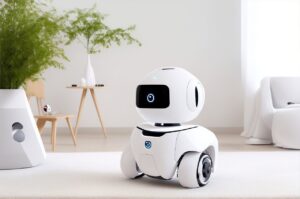The Future of Home-Living
Designing Smart Spaces for Modern Domestic Life
📍 Rimini, Italy (Hybrid)

About the Workshop
The evolution of smart home technologies, particularly agentic ones such as conversational agents, robots, and virtual avatars, is reshaping our understanding of home and domestic life. This shift highlights the complexities of modern domestic life, with the household landscape now featuring diverse cohabiting units like co-housing and communal living arrangements. These agentic technologies present specific design challenges and opportunities as they become integrated into everyday routines and activities.
Our interactive workshop envisions smart homes as dynamic, user-shaped spaces, focusing on the integration of these technologies into daily life. We aim to explore how these technologies transform household dynamics, especially through boundary fluidity, by uniting researchers and practitioners from fields such as design, sociology, and ethnography. Together, we will develop a taxonomy of challenges and opportunities, providing a structured perspective on the integration of agentic technologies and their impact on contemporary living arrangements.
Important Dates
Workshop
Application
May 31, 2024
June 18, 2024
How to Apply?
To participate, please fill out the form: https://forms.gle/wpf3evPr1aFmnNxV9.
If you are interested in submitting additional materials (such as workshop papers, short essays, reflections), please send them to fatemeh.alizadeh@uni-siegen.de.
-

- ©Freepik
-

- ©Unsplash
-

- ©Pixabay
-

- ©Unsplash
Schedule
in Western European Summer Time (WEST)
8:30 – 09:00
Welcome, Agenda, Introduction
09:00 – 09:15
Opening Keynote: David Randall
09:15 – 10:00
Group Discussions - Exploring how new forms of agentic technologies might transform domestic life and what new practices could emerge
10:00 – 10:30
Sharing the Results
10:30 – 11:00
Activity Break
11:00 – 11:45
Group Activity - Designing Headlines for the Future News Papers
11:45 – 12:30
Sharing the Results
12:30 – 13:00
Next Steps, Closing
13:00 - 14:00
Lunch and Networking
-

- ©Pexels
-

- ©Freepik
-

- ©Unsplash
-

- ©Pexels
What can I get out of this Workshop?
All workshop participants will be provided with the latest approaches to the topic of future homes, and you will have the opportunity to interact and collaborate with other participants. We will form individual groups to brainstorm and work on problems relevant to this emerging field. In addition, your submission will be published on the workshop website, and you will become part of an exchange group which should serve as a support line when help is needed dealing with uncommon situations. We will set up a Slack channel that shall be used afterwards as well for sharing resources and planning collaborations. The aim of this workshop is to create a network of researchers, practitioners, and designers engaging with the topic of future homes. We also plan to iterate this workshop at other conferences, e.g., CSCW or CHI, to continue our exchange and collaborative work on this topic.
FAQ
Case studies or new approaches to literature review are fine as long as there is a clear link to Smart Spaces for Modern Domestic Life.
Absolutely. We encourage you to discuss planned and future work at the workshop, but please submit a scientific proposal that focuses on the research questions and methods. However, be aware that your ideas will be discussed publicly afterwards.
We strongly encourage you to contribute to the workshop with a submission, however, please stay in touch with the organizers in case you are interested in participating in the workshop but can’t contribute with a submission. In that case, we might make an exception for you and consider a letter of interest from you.
Organizers

Fatemeh Mahla Alizadeh
Doctoral Researcher at the University of Siegen
in the field of HCI.
Her research primarily explores users’ sense-making of AI-based technologies and how to empower users in the face of technological limitations.

Dennis Paul
Research Associate at
Fraunhofer Institute for Applied Information Technology (FIT)
in the department of Human-Centered Engineering and Design.
In his quantitative UX research, he focuses on psychological factors that influence technology acceptance and user well-being.

Dominik Pins
Research Associate at
Fraunhofer Institute for Applied Information Technology (FIT)
in the department of Human-Centered Engineering and Design.
His research focuses on the acceptance and appropriation of smart technologies and usage practices by users in the domestic context.

Mikołaj P. Woźniak
Doctoral Researcher at the University of Oldenburg
in the field of human-computer interaction.
His work focuses on understanding smart homes as multi-user environments, with focus on empowering inhabitants in diagnosing and troubleshooting glitches with their domestic technology.

Yuhui Xu
Doctoral Researcher at
Eindhoven University of Technology
in the field of HCI in the department of Industrial Design.
His work focuses on care through home things. In his recent qualitative research, he explored designing a chatbot as an agent of everyday objects for mediating expats’ loneliness in home contexts.

Minha Lee
Assistant Professor at Eindhoven University of Technology
in the department of Industrial Design’s Future Everyday group.
Lee’s expertise is in ethics and conversational user interfaces. She was recently elected to chair the CUI Steering Committee and has hosted workshops on CUIs and ethics at conferences like CHI, HRI, CSCW, and IUI.

Sarah Mennicken
Founder of DREI Solutions.
She held industry research roles focusing on the integration of emergent technologies like conversational assistants, AR/VR, and interactive machine learning into everyday experiences. During her PhD, she explored user-centric smart home experiences and hosted workshops on the topic at CHI and Ubicomp.

Dave Randall
Senior Professor at the
University of Siegen.
He has co-authored and edited eight books and in the order of 200 peer reviewed papers on a range of themes, in the main orienting to the role of qualitative research in various domains. This includes one of the earliest studies of people actually living in a Smart home in 2003.

Peter Tolmie
Principal Research Scientist at the University of Siegen
in Information Systems and New Media group.
He has co-authored and edited multiple books and research papers, tackling a diverse set of themes across the fields of HCI, CSCW, and Sociology. A great deal of his research from 2000 to 2015 was conducted in domestic environments.
Header photos are designed by/belong to ©Freepik.
